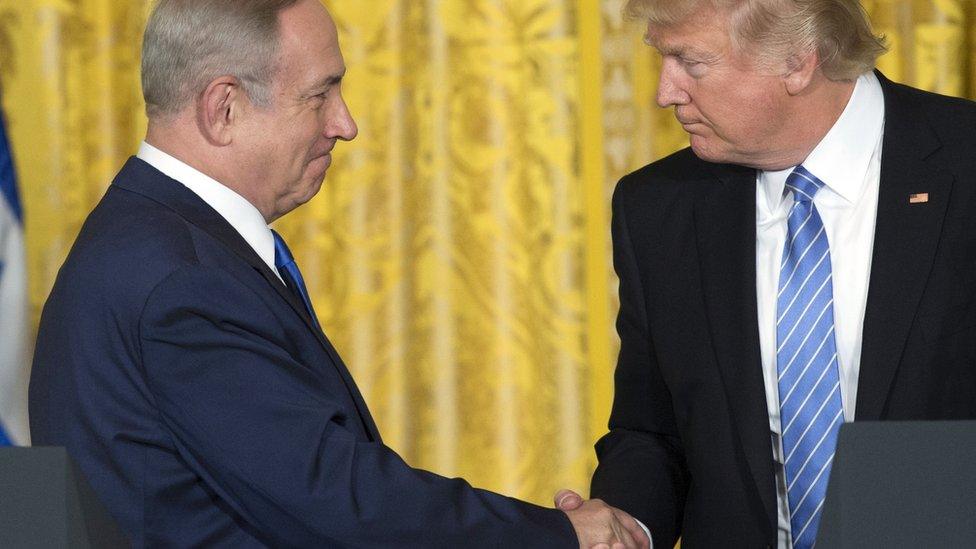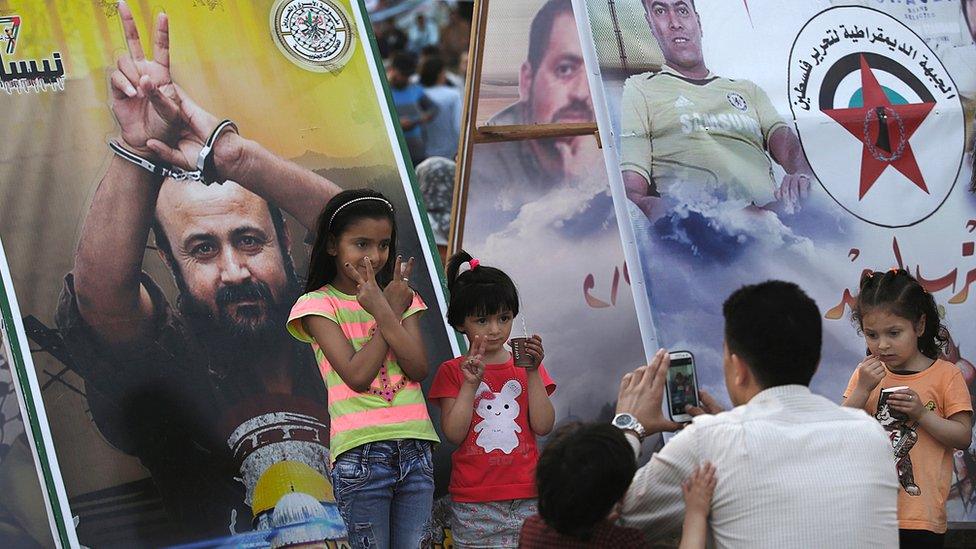Trump tells Abbas 'very good chance' of Mid-East peace deal
- Published
US wants peace for Israel and Palestinians
US President Donald Trump has said there is "a very good chance" of a Middle East peace deal, during talks with Palestinian leader Mahmoud Abbas.
In a joint press conference with his guest at the White House, Mr Trump vowed: "We will get this done".
Mr Abbas told his US counterpart he wants peace based on a longstanding plan for a two-state solution along pre-1967 boundaries.
"Now, Mr President, with you we have hope," Mr Abbas said.
However, Mr Trump has been ambivalent about a two-state solution.

Israeli Prime Minister Benjamin Netanyahu met Donald Trump at the White House in February
In February, he said he was "looking at two-state and one-state, and I like the one that both parties like".
On Wednesday, the US president stressed there would be no lasting peace unless Palestinian leaders spoke out against incitement to violence.
The Palestinian leader is under pressure to halt payments to families of Palestinian prisoners and those killed in the conflict with Israel.
Israel's government says the payments encourage terrorism, but Palestinian officials say stopping them would be politically untenable for Mr Abbas, who is deeply unpopular back home.
Palestinian officials were initially worried by Mr Trump's strongly pro-Israel statements, reports the BBC's Barbara Plett Usher in Washington.
But they have been reassured by one of Mr Trump's envoys that he is serious about a deal, apparently as part of a plan backed by the Arab League at a summit in March.
The 2002 Arab Peace Initiative calls for Israel to withdraw from "all the Arab territories" occupied since the 1967 Middle East war and accept an independent Palestinian state in exchange for "normal relations" with Arab nations.

What is the two-state solution?
A "two-state solution" to the decades-old conflict between Israelis and Palestinians is the declared goal of their leaders and the international community.
It is shorthand for a final settlement that would see the creation of an independent state of Palestine within pre-1967 ceasefire lines in the West Bank, Gaza Strip and East Jerusalem, living peacefully alongside Israel.
The UN, the Arab League, the European Union, Russia and, until now, the US routinely restate their commitment to the concept.

In a speech at an Israeli independence day event at the White House on Tuesday, US Vice-President Mike Pence declared that "valuable progress" was being made towards restarting substantive peace talks for the first time since 2014.
"Momentum is building and goodwill is growing," he added.
Three influential Republican senators, meanwhile, called on Mr Trump to tell Mr Abbas to stop using aid money to pay the families of Palestinian "martyrs" and those imprisoned in Israel for offences ranging from stone-throwing to murder.
"Morally it must end because the United States cannot be complicit in incentivising terror," Marco Rubio, Tom Cotton and Lindsey Graham wrote in a joint letter, external.
"And strategically it must end because the PA will never convince Americans, the Congress, or Israel that it is serious about peace while it is still funding terror."

Hundreds of Palestinian prisoners in Israeli jails are taking part in a hunger strike
The PA spends about $300m (£232m) each year - about 8% of its budget - on salaries and benefits under the programme, according to the senators.
The chairman of the Palestinian Prisoners' Affairs Committee has defended, external the payments, saying they represent a "national, humanitarian and social duty that shall always be fulfilled regardless of Israeli and international pressures".
An adviser to Mr Abbas also told the Associated Press, external that the president could not afford to concede, especially with one of his main rivals leading a widely supported hunger strike by hundreds of Palestinian prisoners in protest at conditions in Israeli jails and the detention of people without trial.
Correction 16 May 2017: In his remarks on 3 May, Donald Trump said Palestinian leaders, rather than Palestinian and Israeli leaders as reported in an earlier version of this story, should speak out against incitement to violence.